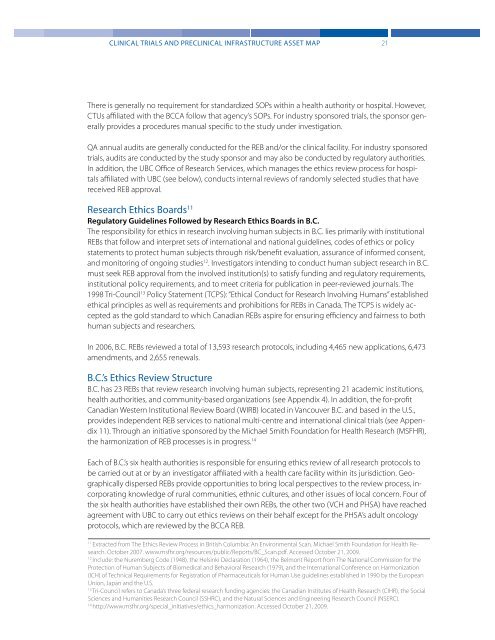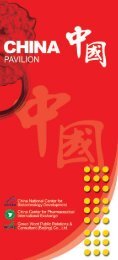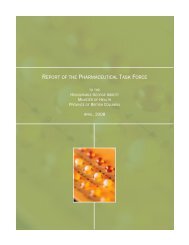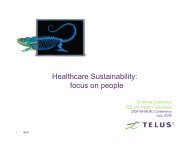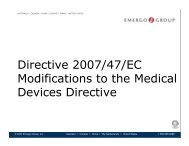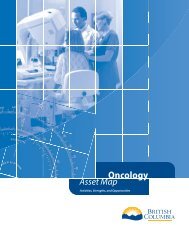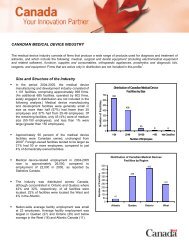Clinical Trials and Preclinical Infrastructure Asset Map - Life Sciences
Clinical Trials and Preclinical Infrastructure Asset Map - Life Sciences
Clinical Trials and Preclinical Infrastructure Asset Map - Life Sciences
Create successful ePaper yourself
Turn your PDF publications into a flip-book with our unique Google optimized e-Paper software.
CLINICAL TRIALS AND PRECLINICAL INFRASTRUCTURE ASSET MAP<br />
21<br />
There is generally no requirement for st<strong>and</strong>ardized SOPs within a health authority or hospital. However,<br />
CTUs affiliated with the BCCA follow that agency’s SOPs. For industry sponsored trials, the sponsor generally<br />
provides a procedures manual specific to the study under investigation.<br />
QA annual audits are generally conducted for the REB <strong>and</strong>/or the clinical facility. For industry sponsored<br />
trials, audits are conducted by the study sponsor <strong>and</strong> may also be conducted by regulatory authorities.<br />
In addition, the UBC Office of Research Services, which manages the ethics review process for hospitals<br />
affiliated with UBC (see below), conducts internal reviews of r<strong>and</strong>omly selected studies that have<br />
received REB approval.<br />
Research Ethics Boards 11<br />
Regulatory Guidelines Followed by Research Ethics Boards in B.C.<br />
The responsibility for ethics in research involving human subjects in B.C. lies primarily with institutional<br />
REBs that follow <strong>and</strong> interpret sets of international <strong>and</strong> national guidelines, codes of ethics or policy<br />
statements to protect human subjects through risk/benefit evaluation, assurance of informed consent,<br />
<strong>and</strong> monitoring of ongoing studies 12 . Investigators intending to conduct human subject research in B.C.<br />
must seek REB approval from the involved institution(s) to satisfy funding <strong>and</strong> regulatory requirements,<br />
institutional policy requirements, <strong>and</strong> to meet criteria for publication in peer-reviewed journals. The<br />
1998 Tri-Council 13 Policy Statement (TCPS): “Ethical Conduct for Research Involving Humans” established<br />
ethical principles as well as requirements <strong>and</strong> prohibitions for REBs in Canada. The TCPS is widely accepted<br />
as the gold st<strong>and</strong>ard to which Canadian REBs aspire for ensuring efficiency <strong>and</strong> fairness to both<br />
human subjects <strong>and</strong> researchers.<br />
In 2006, B.C. REBs reviewed a total of 13,593 research protocols, including 4,465 new applications, 6,473<br />
amendments, <strong>and</strong> 2,655 renewals.<br />
B.C.’s Ethics Review Structure<br />
B.C. has 23 REBs that review research involving human subjects, representing 21 academic institutions,<br />
health authorities, <strong>and</strong> community-based organizations (see Appendix 4). In addition, the for-profit<br />
Canadian Western Institutional Review Board (WIRB) located in Vancouver B.C. <strong>and</strong> based in the U.S.,<br />
provides independent REB services to national multi-centre <strong>and</strong> international clinical trials (see Appendix<br />
11). Through an initiative sponsored by the Michael Smith Foundation for Health Research (MSFHR),<br />
the harmonization of REB processes is in progress. 14<br />
Each of B.C.’s six health authorities is responsible for ensuring ethics review of all research protocols to<br />
be carried out at or by an investigator affiliated with a health care facility within its jurisdiction. Geographically<br />
dispersed REBs provide opportunities to bring local perspectives to the review process, incorporating<br />
knowledge of rural communities, ethnic cultures, <strong>and</strong> other issues of local concern. Four of<br />
the six health authorities have established their own REBs, the other two (VCH <strong>and</strong> PHSA) have reached<br />
agreement with UBC to carry out ethics reviews on their behalf except for the PHSA’s adult oncology<br />
protocols, which are reviewed by the BCCA REB.<br />
11<br />
Extracted from The Ethics Review Process in British Columbia: An Environmental Scan. Michael Smith Foundation for Health Research.<br />
October 2007. www.msfhr.org/resources/public/Reports/BC_Scan.pdf. Accessed October 21, 2009.<br />
12<br />
Include: the Nuremberg Code (1948), the Helsinki Declaration (1964), the Belmont Report from The National Commission for the<br />
Protection of Human Subjects of Biomedical <strong>and</strong> Behavioral Research (1979), <strong>and</strong> the International Conference on Harmonization<br />
(ICH) of Technical Requirements for Registration of Pharmaceuticals for Human Use guidelines established in 1990 by the European<br />
Union, Japan <strong>and</strong> the U.S.<br />
13<br />
Tri-Council refers to Canada’s three federal research funding agencies: the Canadian Institutes of Health Research (CIHR), the Social<br />
<strong>Sciences</strong> <strong>and</strong> Humanities Research Council (SSHRC), <strong>and</strong> the Natural <strong>Sciences</strong> <strong>and</strong> Engineering Research Council (NSERC).<br />
14<br />
http://www.msfhr.org/special_initiatives/ethics_harmonization. Accessed October 21, 2009.


